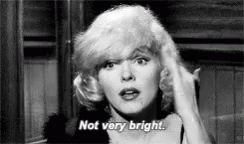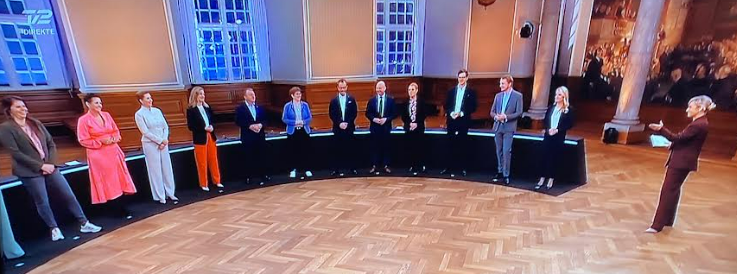The Danish election was held yesterday.
It looks at this point as though for all the drama and intrigue, for all the weirdness and confusion, for all the gains of some parties and all the losses of some others, nothing has actually changed: we’ll still have a red bloc (leftist) government with Mette Frederiksen as Prime Minister.
The status quo won.
That’s probably the most interesting thing about this election. Danes are being thrashed by inflation and energy prices, the health system is in crisis, we’re still the most heavily taxed people on earth—and we go to the polls and say, Please, sir, we’d like some more.

That’s not how the analysts and experts seem to see it: they’re so busy picking apart the details that they seem to have lost sight of the whole. On television, on the radio, in the press: they’re all zooming in on the thousand and one little weirdnesses and oddities and ignoring the one truly astonishing thing:
Danes are largely okay with the status quo.
It’s an extraordinary thing to behold with American eyes. The equanamity of the Danish electorate is truly one of the great wonders of the world.
If ever there was going to be a “throw the bums out” election cycle in Denmark, it should have been this one. Almost everything Danes are complaining about right now is a direct consequence of the policies pursued by the current government (and their like-minded peers in Brussels), but it’s as if cause and effect have no relationship. Chalk it all up to bad luck and re-elect the poor sods: maybe this time they’ll be luckier!
I have nothing else worthwhile to say about the Danish election.
I would however like to talk about one little snippet of commentary being tossed about in the whirlwind: there’s been some discussion about whether the “North Atlandtic mandates”—the four parliamentary seats delegated to the Faroe Islands and Greenland—should be able to decide a national election.
See, within the nation of Denmark the red bloc only won 87 seats. That’s not a majority. With three of the four Greenland and Faroe mandates going to the red bloc, the left got their 90-seat majority. So those damned Greenlanders and Faroe Islanders cast the deciding votes!
This reminds me of American Democrats (including journalism!ists) blaming Joe Manchin for not being able to pass their omnibus “Build Back Better” boondoggle. It’s the same want of logic.
The seats of a political body—whether the Danish Folketing or the U.S. Senate—are fungible, like money: that is to say, any given seat has the same exact value as every other seat. Had the blue bloc parties within Denmark won more seats, the four North Atlantic seats wouldn’t have mattered. Nor would they have mattered had the red bloc won more seats within Denmark proper. By the same token, had Senate Democrats managed to persuade just one Republican senator to vote for their monster bill, they wouldn’t have needed Joe Manchin’s vote.
So the Greenland and Faroe Island seats were no more or less important or decisive than any other particular seats. And yet:
“After several hours of uncertainty,” wrote DR, “it was clear that the red bloc with the Social Democrats, Radikale Venstre, Enhedslisten, Alternativet and SF would collect 87 mandates. And with the North Atlantic mandates, the red bloc got its majority.”
You could say the same of any three seats in Denmark that went to the red bloc.
“Well,” you could say (for example), “without those three mandates the Social Democrats got from (insert region of your choice), they wouldn’t have achieved a majority.”
So what?
If you were trying to spend under a hundred bucks on your groceries but ended up spending $101, which particular “dollar” would you say put you over the top? It’s easy to blame the gum you picked up at the check-out stand right before you paid—but it could just as easily have been the laundry detergent, the peanut butter, the toilet paper. It could have been the the very first thing you put in your cart. Anything.
After all, if you hadn’t bought butter then you’d have been under $100 even with the gum.
Obviously, right? I mean, this isn’t even math, it’s the most elementary logic.
(Technically it’s the commutative property of addition, which sounds like math but isn’t. It’s a logical property of mathematics.)
Simple as it may be, many otherwise bright people still think that Florida decided the 2000 election in the United States. It didn’t. It felt that way because of all the theatrics with the vote counts nand recounts (and non-counts), but if Al Gore had won, say, Ohio and his home state of Tennessee, or Georgia and Indiana, he wouldn’t have needed Florida. It wouldn’t have mattered. Florida was the last state to certify its results, but it was no more imporant than the first in deciding the election for Bush.
Let’s flog this dead horse just a little more because it deserves it.
Blaming Florida for Gore’s loss, or Greenland for Mette Frederiksen’s win, is like blaming a particular set of ice crystals for the sinking of the Titanic. The specific ice crystals that actually received the impact of the hull weren’t the problem: the ship could have sliced through them with ease. The problem was the sheer totality of all the ice crystals comprising the iceberg behind them.
I could keep going. I feel like I should, because people just don’t seem to understand that when it’s said something was “the straw that broke the camel’s back” it doesn’t mean oh my god what the hell kind of monster straw was that, that it could break the sturdy spine of a massive mammal? It only means that the poor camel was already overburdened. It’s not a criticism of the straw, but of the burden that was already there.
But I’ll cut the whole commentariat some slack because by the time today’s stories were filed they were surely exhausted from the month of campaign coverage that preceded last night’s concluding act.
One other little thing caught my eye. In an interview with Politiken, Anders Fogh Rasmussen observed that if the Moderates and Denmark’s Democrats hadn’t splintered off from Venstre, then the party would have received about a third of the vote, making them the biggest party in parliament.
“They ought to be able to be in the same party,” he says, “but on account of all that (splitting) it’s no wonder that tonight we (Venstre) suffered such a large loss of seats.”
No wonder indeed: cut off a couple of Liberace’s fingers and he suffers a large loss of rings… and his piano playing probably suffers a little, too.
(Anders Fogh Rasmussen, too, was surely just exhausted.)
The Danish right as a whole is in tatters today. It’s a wreck. They lost an election they ought to have won handily because the three parties that have for all of my time in Denmark served as their base lost 33 seats between them.
It’s no good blaming the new (and newer) parties for the loss: they only came into existence because of problems within the old coalition—problems that were as often personal as political.
Liberal Alliance, DanmarksDemokraterne, and Nye Borgerlige can and should be pleased with their results—but they should also be sober enough to realize that although they each individually grew their own brands, they didn’t grow them enough to change the political landscape in Denmark. The left is still calling the shots.
Maybe a few more years in the wilderness will do the Danish right some good: there are plenty of lessons to be learned from yesterday’s results.
Let’s hope they can learn, because as painful as the election results may have been for the right, another four years of the status quo will be painful for the nation as a whole.
But idle speculation is meaningless.
“If we had some bacon,” my father would say when he caught me over-hypothesizing, “we could have bacon and eggs… if we had some eggs.”
The status quo won and winter is coming.

When we enter the winter months and continue our downward spiral into an economic depression, at least the architects of this mess will be at the helm.
The rest of us will have to content ourselves with “Don’t blame me, I voted for Kodos” t-shirts.
Quite. Of course, it has been transparently clear for a long time that the helmsmen of the old so-called “borgerlige” parties have completely shot their bolt. They are exactly as feckless and impotent as they have appeared to be for the past few years. It is not that Mette Frederiksen is a particular skilled or impressive Prime Minister. Hardly that. But she does have the enormous advantage of the main opposition parties being utterly devoid of purpose, will, principles, ideas or semblance of charisma. They are essentially vying to continue the Social Democratic welfare state in its entirety, even growing it, and their entire argument boils down to being somehow and improbably able to deliver social democracy better than the real thing. To which, the electorate replied, nah.